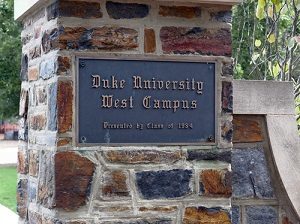Duke Pays Big to Settle Whistleblower Charges of Scientific Research Fraud

On Monday, Duke University agreed to pay $112.5 million to settle charges in violating the False Claims Act by submitting falsified research on federal grants from the National Institutes of Health and Environmental Protection Agency. It is one of the largest settlements by a university for research fraud, and one the government hopes will send a strong message to the academic community. See DOJ Press Release.
According to the government and the whistleblower who initiated the action, between 2006 and 2018, Duke submitted claims to the NIH and EPA containing falsified data in dozens of grants worth hundreds of millions of dollars. The allegations centered around the results Duke reported on research related to the lung function of mice conducted by Erin Potts-Kant, a Duke research technician in its Airway Physiology Laboratory. Ms. Potts-Kant was supposed to certify the validity of the unit’s work, but instead allegedly engaged in systematic research fraud, including making up data outright.
As reported by the New York Times, Duke officials said they discovered the possible research misconduct in 2013, after Ms. Potts-Kant was fired for embezzling funds. What Duke did once it discovered the fraud and why it took another six years to reach this week’s settlement is not clear. What is clear is that the university wants to move forward and make sure this kind of fraud does not resurface in its research activity. Duke president Vincent E. Price emphasized this “difficult moment” for the university, the “devastating impact” it is feeling, and how the case “reinforces the need for all of us to have a focused commitment on promoting research integrity and accountability.”
In announcing the settlement, the government reinforced its commitment to going after this kind of research fraud:
May this serve as a lesson that the use of false or fabricated data in grant applications or reports is completely unacceptable. . . . This settlement sends a strong message that fraud and dishonesty will not be tolerated in the research funding process.”
The allegations originated in a whistleblower lawsuit filed under the qui tam provisions of the False Claims Act by Joseph Thomas, a fellow researcher at Duke. Thomas’ attorneys told NPR the lawsuit was motivated by his concerns that the university wasn’t being transparent enough, after “Duke’s administration and researchers faced the reality that seven years of data were false or unreliable.” Mr. Thomas will receive a whistleblower award of $33,750,000 from the proceeds of the government’s recovery.
Given the size of the payout, the elite status of Duke as a premier research institution, and the high-profile nature of the government’s enforcement action, this settlement is surely to resonate within the academic community. Universities and other recipients of federal grants would be wise to beef up their internal compliance and make sure they do not become the next target of a similar whistleblower or government enforcement action.
READ MORE:
- False Claims Act
- Constantine Cannon’s Whistleblower Team
- I Think I Have a Whistleblower Case
- Submit a Confidential Whistleblower Claim
- Whistleblower FAQs
Tagged in: FCA Federal, Grant and Research Fraud, Whistleblower Case, Whistleblower Rewards,